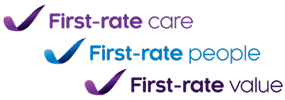Introduction to the class
You have been referred to this class because you have Rotator Cuff Related Shoulder Pain (RCRSP).
RCRSP is a term used when describing pain that is related to the muscles of your shoulder called your rotator cuff. These muscles control your shoulder during movements of lifting the arm away from body, such as reaching upwards or when placing the hand behind your back.
This pain may have come on gradually or suddenly, if the shoulder has been overused in any way beyond its normal use e.g. repeatedly lifting boxes whilst moving house.
This is a very common condition and research has shown that with the right type of exercise based rehabilitation and a greater understanding of how to manage this problem, that people can successfully return to normal daily function. It may take at least 6 weeks before you start to see improvements in your pain.
Class Weekly Education Topic Schedule
All class sessions consist of exercise and education discussing the below topics:
- Session 1: What is RCRSP?
- Session 2: What causes pain?
- Session 3: Pacing
- Session 4: Role of investigations
- Session 5: The management options for RCRSP
- Session 6: Managing flare ups
- Session 7: Goal setting and myth–busting
- Session 8: Benefits of long term exercise
Programme Aims
The goal of this programme is to improve the function of your shoulder whilst also learning about the condition and how best to manage it. Most people find that by the end of the sessions they feel a reduction in their symptoms, however it can take up to 6 months to see a bigger change.
The programme aims to help you manage your symptoms more effectively, enable you to be more active, to understand more about the problem. We will also give you strategies to help in the long-term.
The class aims to highlight the importance of your understanding and appreciation for the benefits of exercise. But how do you feel about exercise at the moment? Do you think it will help or not? What are your previous experiences?
By the end of the programme we hope to have improved your feelings of self control over your shoulder pain.
Session 1: What is RCRSP?
RCRSP is very common and causes pain in the shoulder and upper arm. It can spread further down the arm and up towards the neck and shoulder blade. It can feel worse when the arm is moved away from the body such as reaching up or when placing the hand behind the back.
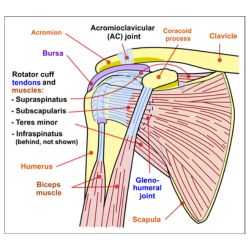
Session 2: What causes pain
When you have had shoulder pain for a while, there are changes that occur secondary to the original problem. Avoiding activities or movements leads to loss of flexibility, strength and stamina. Doing less exacerbates these symptoms, so it’s important to exercise in a controlled way.
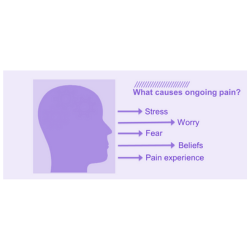
Other factors can also influence our pain. Worry, stress, fear and our previous pain experiences can all increase our perception of pain.
Managing these other factors with socialising, relaxation and exercise can help control pain. Research shows that people who engage in these aspects of pain management do better than those who do not.
Session 3: Pacing
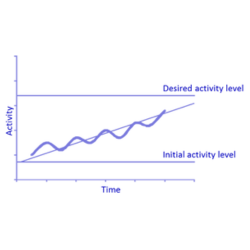
It is important to strengthen your shoulder in a controlled way.
The aim is to reduce pain and symptoms associated with RCRSP to help the muscle, tendon and related structures to tolerate imposed loads. The shoulder should be gradually reloaded.
If you do experience extra pain, it does not mean that you have caused any damage to your shoulder, it is simply that the muscles are adjusting to the new demands placed on them. Remember ‘hurt doesn’t mean harm’.
Pacing often requires stopping before you feel you need to.
Session 4: The Role of Investigations in Non-traumatic Shoulder Pain
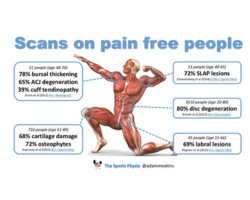
The above diagram highlights some common findings from MRI’s completed on people WITHOUT pain.
Imaging findings such as tears or ‘bursal thickening’ are just as common in people without pain as they are in people with pain.
This means that the findings on an image are often not the cause of your pain, and the images cannot reliably tell us what the problem is. As we get older, it’s normal to see structural changes in the shoulder.
Getting better is not related to ‘fixing’ what is found on the scan.
Session 5: Management options for RCRSP
Surgery
In 2017, a large research study compared patients who had surgery versus those who did not. There was no significant difference in outcome.
There are rare cases that time and Physiotherapy may not help, therefore your GP can refer you to a consultant if you wish. There are risks with surgery such as infection, nerve damage, thrombosis and having a general anesthetic.
Injections
For some people experiencing very high levels of pain, a local steroid injection can help them. It is a temporary tool to reduce pain and allow them to exercise. This can break the vicious cycle of pain. There are risks associated with injections which should be discussed with your clinician.
Pain relief
Taking adequate pain relief initially can allow you to be compliant with some gentle exercises, breaking the cycle of pain. If you are unsure what you can / should be taking please discuss this with your Pharmacist / Doctor.
Physiotherapy
Research shows Physiotherapy to be as effective as surgery and in some studies more effective
Session 6: Managing Flare-ups
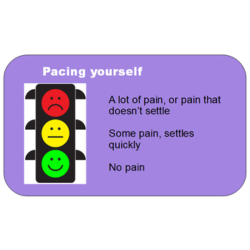
Tendons do not like ‘overload’, this can make them painful. A flare-up of pain might be because load was increased too much or too quickly.
Remember - pain does not equal harm. Usually the muscles around the shoulder need to be strengthened to cope with your day to day activities.
If you get a flare up - don’t panic! Take some rest, don’t stop altogether, keep moving and modify your activities if needed for a short period of time. Then you can restart your normal activities as soon as possible
Session 7: Goal Setting and myth-busting
It is much easier to keep motivated to exercise and be more active if you set clearly defined goals.
Long term goals however can be daunting and off-putting, so consider the smaller steps you need to take to achieve your long term goals.
An example of step by step goals may be brushing teeth then washing hair and finally, putting plate on top shelf.
What goals will you set yourself today?
In the next 6 weeks i will be able to:
In the next 3 months i will be able to:
In the next year i will be able to:
Session 8: Benefits of Long term-exercise
PHYSICAL:
- Strength
- Flexibility
- Fitness
- Weight control
- Reduced disease risk
Balance
Function
SOCIAL:
- Independance
- Meet People
- Have fun
PSYCHOLOGICAL:
- Clear head
- Improve sleep
- Confidence
- Mood
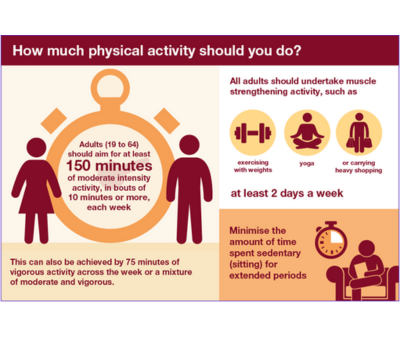
Myth-busting
“Rotator cuff problems are uncommon”
While they may often be confused with other shoulder injuries, they are still considered extremely common with the Rotator Cuff being involved in approximately 70% of all patients experiencing shoulder pain.
“MRI is needed to diagnose a rotator cuff injury”
Even though an MRI can be helpful to diagnose an injury, they are not always necessary for diagnosis. In fact, most Rotator Cuff injuries can be diagnosed through more traditional ways like functional movement assessments which test your shoulders movement and strength.
“I need surgery to fix my rotator cuff injury”
Many rotator cuff injuries recovery very well without the need for surgery. Surgery may be recommended if the rotator cuff is completely ruptured, otherwise, it is often recommended to try conservative options such as exercise as the first steps to treatment.
“Exercise makes rotator cuff injuries worse”
Whilst some activities can make the pain worse, for example if they require lifting a lot of weight, you do not need to avoid all activity altogether. In fact, long periods of inactivity may be detrimental as it can increase the risk of compensations, deconditioning and longer term problems.
Additionally, strengthening the Rotator Cuff muscles can help to relieve Rotator Cuff pain and make movement easier.
Please ask your physiotherapist or class instructor about exercise opportunities in the local community, or look up the website links below:
First Community provides front-line NHS community healthcare services in east Surrey and parts of West Sussex.
We provide first-rate care, through our first-rate people, offering first-rate value. For more information visit: www.firstcommunityhealthcare.co.uk
If you would like this information in another format, for example large print or easy read, or if you need help communicating with us:
First Community (Head Office)
Call: 01737 775450 Email: fchc.enquiries@nhs.net Text: 07814 639034
Address: First Community Health and Care, Orchard House, Unit 8a, Orchard Business Centre, Bonehurst Road, Redhill RH1 5EL
- Twitter: @1stchatter
- Facebook: @firstcommunityhcNHS
- Instagram: firstcommunityhealthandcare
- LinkedIn: www.linkedin.com/company/first-community-health-&-care-c-i-c-/
- TikTok: www.tiktok.com/discover/first-community-health-and-care
To print this page, please select accessibility tools and the print this page icon.
For office use only: Version 1 PFD_TS089 Publication date: May 2024


